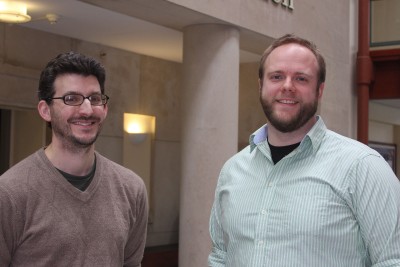
A prestigious $400,000 federal grant will allow the Neag School of Education‘s Measurement, Evaluation and Assessment (MEA) Department to not just recruit and support four much-needed fellows, but to help meet the nationwide demand for better standardized tests to assess academic growth and educational effectiveness.
Designed to create jobs and expand research in fields critical to the United States’ economic and social well-being, this selective Graduate Assistance in Areas of National Need (GAANN) award from the U.S. Department of Education also recognizes UConn and the Neag School of Education as leaders in the rapidly-growing field of psychometrics—the science of using standardized techniques and data to effectively measure, evaluate and assess performance.
“Standardized test scores in education have always been important, but now they’re really taking a front seat as more states and school districts are using them to not just evaluate student knowledge, but teacher performance,” said UConn MEA Program Coordinator Betsy McCoach, Ph.D.
“Educators are using standardized test results to make large-scale decisions like how to best close the achievement gap; administrators are using them to consider which teachers to hire and fire; and families are using them to make life-changing decisions like where to live and raise their children,” McCoach continued. “The list of how standard assessments are increasingly being used goes on, but what all the items on that list have in common is that they’re high-stakes decisions—which means that the tests being used to guide these decisions must be accurate and effective.”
The GAANN grant for MEA fellows was one of five totaling $2.1 million that UConn received. In addition to the Neag School of Education, awards for “strong contribution and leadership in meeting areas of national need” were presented to the UConn School of Nursing, School of Engineering, Office of the Provost and the Department of Chemical, Materials & Biomolecular Engineering, said Kent Holsinger, interim vice provost for graduate studies and dean of the Graduate School.
Grant-funded MEA fellows will focus on both improving current testing practices and creating new ones, McCoach said: “Tests are created and validated for particular purposes, and an unfortunate reality of education today is that many tests are being used for purposes other than those for what they were intended.”
Today’s educational climate also requires psychometricians to be forward-thinking and willing to work closely with states and school districts.
“The research we conduct needs to be empirically and scientifically rigorous, rather than designed to meet a certain political viewpoint,” McCoach added. “Graduates of this program are expected to contribute to the nation’s understanding of learning, academic growth and educational effectiveness—to really push the envelope on what we know about, and how we use, standardized tests.”
For each of the three years of this MEA Ph.D. program, the GAANN fellowships will cover tuition, health insurance and other school fees, as well as provide an annual $30,000 stipend. The four-person cohort will start in the fall of 2013.
Students will work closely with all MEA faculty, which in addition to McCoach, an associate professor, includes Professor Hariharan Swaminathan, PhD; Associate Professor H. Jane Rogers, Ph.D.; Assistant Professor Megan Welsh, Ph.D.; and Assistant Professor Chris Rhoads, Ph.D.
Past, successful MEA doctoral students have entered the program from many fields, including psychology, statistics, mathematics, economics, sociology and education. McCoach also encourages current educators to consider the opportunity: “Educators interested in testing and looking to change how they contribute to the field may find this to be an incredible opportunity. We’re looking to bring in not just talented students, but a diverse group representative of the diverse population of students they ultimately are going to serve.”
Applicants must be U.S. citizens, demonstrate financial need and submit all needed forms and materials before Feb. 1, 2013. For details, visit the MEA website or contact McCoach at betsy.mccoach@uconn.edu.
MEA Ph.D. graduates typically pursue careers in academia; join state or federal agencies like the Connecticut Department of Education; are recruited by Pearson, Riverside or other standardized testing companies; or work with educational research non-profits like the American Institutes for Research or Education Development Center, McCoach said.
“Whether or not you’re a believer in standardized tests, the reality is that they’re here and being used more and more,” she added. “Our goal is to make good tests even better, as well as to create even more effective evaluation tools. It’s exciting and important work.”
 Facebook
Facebook
 Twitter
Twitter
 LinkedIn
LinkedIn
